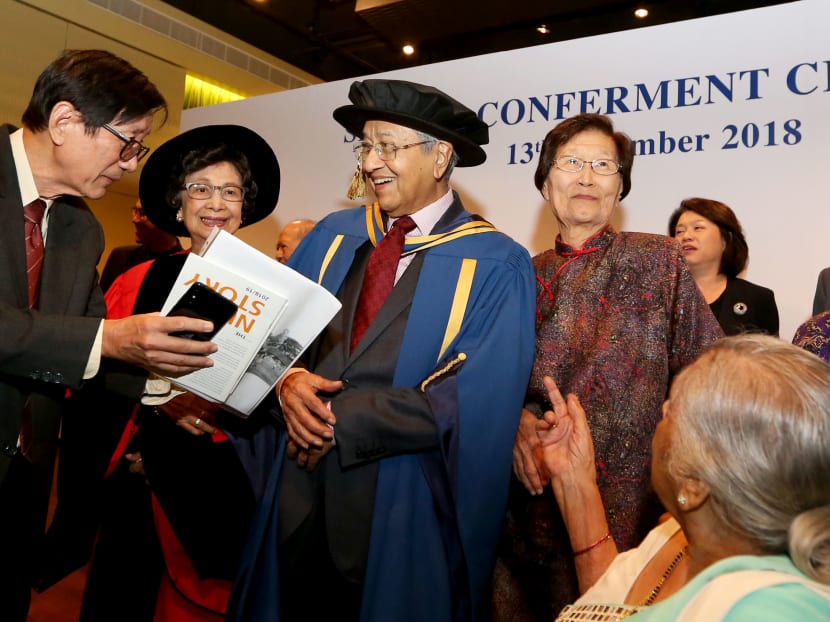Asean must be proactive not reactive, or risk being left behind in 4th industrial revolution: Mahathir
SINGAPORE — Malaysian Prime Minister Mahathir Mohamad has urged the Association of South-east Asian Nations (Asean) not to be reactive or it will risk being left behind in the fourth industrial revolution.

Malaysia’s Prime Minister Mahathir Mohamad (third from left) met his former classmates from the King Edward VII College of Medicine, the predecessor institution of the National University of Singapore. He was conferred the Honorary Doctor of Laws on Nov 13, 2018, during his visit to Singapore. His wife, Dr Siti Hasmah (second from left), was also presented with the Distinguished Alumni Service Award.
SINGAPORE — Malaysian Prime Minister Mahathir Mohamad has urged the Association of South-east Asian Nations (Asean) not to be reactive or it will risk being left behind in the fourth industrial revolution.
Giving a keynote speech at the Asean Business and Investment Summit here on Tuesday (Nov 13), Dr Mahathir stressed the need to be “proactive” when it comes to implementing a regional integration of economic policies that will benefit all 10 nations of the regional grouping.
To ensure all countries benefit, there is a need to understand that each country is at a different stage of economic development, he said. There should be flexibility in adopting certain policies so that “countries that are ready to move fast will be allowed to do so first, but to always be mindful of the constraints of the others”.
The Malaysian leader, who is in Singapore for a two-day official visit, said that there are multiple “megatrends” that affect Asean now. These include the fourth industrial revolution, technological transformation as well as rising trade tension.
“One key question underpinning regional economic integration is whether Asean’s past experience and achievements are enough to sustain the attractiveness and competitiveness of the regional grouping,” he said.
“Rapid technological advancement places tremendous pressure on the way we do business. Governments must work more closely with the private sector to alleviate some of the difficulties that they face."
Asean nations, he said, should develop capabilities to produce their own goods and services for individual benefit and then export them to other member countries.
Governments need to create opportunities so that small- and medium-sized enterprises (SMEs) may grow their businesses in the region, he added.
NUMBERS COUNT: 640 MILLION IN ASEAN MARKET
“We need to improve our infrastructures and strengthen economic connectivity and make full use of the 640 million people of Asean as a domestic market. Although we may be poor, but numbers count in the strength of markets,” he stressed, urging the grouping to raise intra-regional trade — which has been stagnant at around 25 per cent — to more than 30 per cent.
Describing the fourth industrial revolution, or Industry 4.0, as the “new buzzword”, Dr Mahathir said it transforms how products are designed, fabricated, used and operated as well as how they are maintained and serviced.
It will transform the operations, supply chain management and energy footprint, among others, of factories in the region.
“It is imperative that Asean is not left behind in this Industry 4.0 wave and must strive to move along and keep pace with these latest developments.”
In his 30-minute speech at the Marina Bay Sands Expo and Convention Centre, Dr Mahathir pointed out that technological transformation is another trend sweeping the region, forcing governments to re-evaluate how their manufacturing industries operate.
This calls for the need to develop advanced manufacturing capabilities through investment in high-tech infrastructure and quality education, he said.
“Asean economies must be able to participate in these megatrends if their futures are to be assured," he said. “Threats to the value of their labour, skills sets, foreign direct investment, income and wealth distribution and, ultimately, governance systems are even now growing, and likely to become more critical in the future.”
The ability to participate in the fourth industrial revolution “depends critically” on Asean’s capacity to innovate and to keep abreast of other emerging global trends such as financial technology or fintech, he added.
“The rapid adoption of technology, high levels of mobile usage and rising rates of Internet penetration, coupled with an increasingly urban, literate young population, as well as SMEs under-served by traditional banking systems, have created a demand for fintech solutions.”
Governments should be more receptive and work out regulatory mechanisms as they include such new trends into the present financial environment, he said.
When it comes to global developments, Dr Mahathir said that the trade war between the United States and China will create a “domino effect”, and it can lead to other developed nations adopting protective measures against developing countries, including those in Asean.
This is already “slowly taking place” within the regional group, as countries implement “inward-looking” policies. Rather than “to close our doors”, he said trade issues should be resolved through dialogues.
Earlier in the day, Dr Mahathir was conferred the Honorary Doctor of Laws by his alma mater, the National University of Singapore, for his outstanding leadership and “enduring contributions” to the bilateral relations between Singapore and Malaysia.
His wife, Dr Siti Hasmah Mohd Ali, was also honoured with the Distinguished Alumni Service Award for being an inspiring role model to female doctors in Malaysia and for her contributions in the area of public health in her home country.






